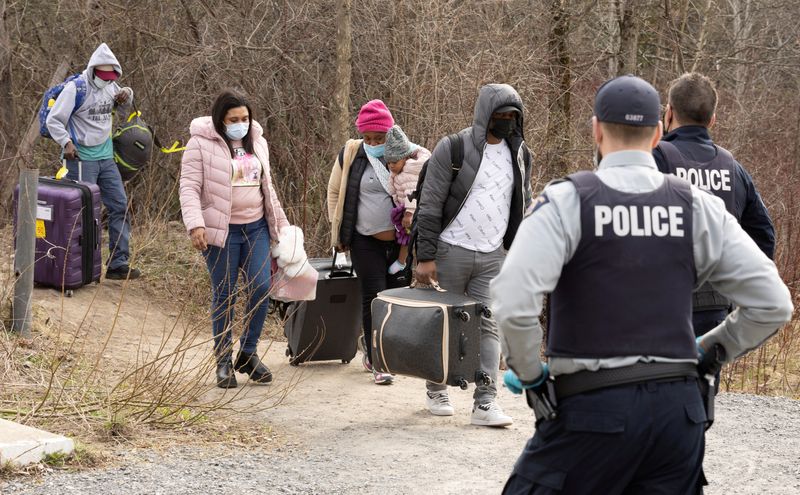By Anna Mehler Paperny
TORONTO (Reuters) - A years-long fight over what Canada owes would-be refugees will have its day in the country's highest court Thursday and the decision could have implications beyond the asylum system, affecting how Canada's laws are challenged and how people prove their rights have been breached.
The court will be asked to decide whether Canada can trust the United States to respect vulnerable people's rights and under what circumstances Canada is responsible if the U.S. asylum and detention systems breach them.
Refugee advocates are seeking to overturn the 20-year-old Canada-U.S. Safe Third Country Agreement (STCA), arguing it violates asylum-seekers' rights to equal treatment and to life, liberty and security of the person under Canada's Charter of Rights and Freedoms.
Under STCA, which came into effect in 2004, each country turns back asylum-seekers trying to enter at formal land border crossings on the grounds that they should apply for refugee status in the first "safe" country they arrive in.
The asylum-seekers affected are predominantly trying to head north, into Canada, whose asylum system is seen as more welcoming than that of the United States.
Refugee advocates argue the agreement breaches asylum-seekers' rights by subjecting them to potential detention and deportation.
Canada's government argues the agreement is part of the country's administration of its asylum system, that not everyone turned back is detained, that their treatment does not breach rights in a way that "shocks the conscience" and that there are adequate safety valves in place.
In May, Canada Border Services Agency told Reuters it does not track how often, if ever, it applies these safety valves. The agency has not yet responded to follow-up questions posed in May and last week.
'RIPPLE EFFECTS'
The hearing is expected to last one day. There is no set time frame for a decision.
"This has potential to have really broad ripple effects as regards access to justice," said refugee lawyer and University of British Columbia professor Efrat Arbel, who is acting as counsel for one of the interveners in the case.
"It's not just whether there's a breach (of rights) but what is necessary in order to evaluate whether there's a breach. … That's why the implications are so significant."
Federal courts have twice sided with refugee advocates in two separate challenges of the agreement and twice those rulings were overturned on appeal, which now brings the parties to Canada's Supreme Court.
If the Supreme Court sides with the appeals court, it could make it more difficult for parties to challenge Canadian laws, obliging them to challenge the way they're administered.
The ruling could also set precedents regarding what evidence is needed to prove rights are being breached.
Meanwhile, Canada has been lobbying the U.S. to extend the agreement so it applies to the whole land border – not just at formal crossings.

The number of asylum-seekers entering Canada between border crossings has risen to the highest level since the government started tracking them in 2017.
A spokesperson for Immigration, Refugees and Citizenship Minister Sean Fraser told Reuters in September they had no updates regarding expansion talks.